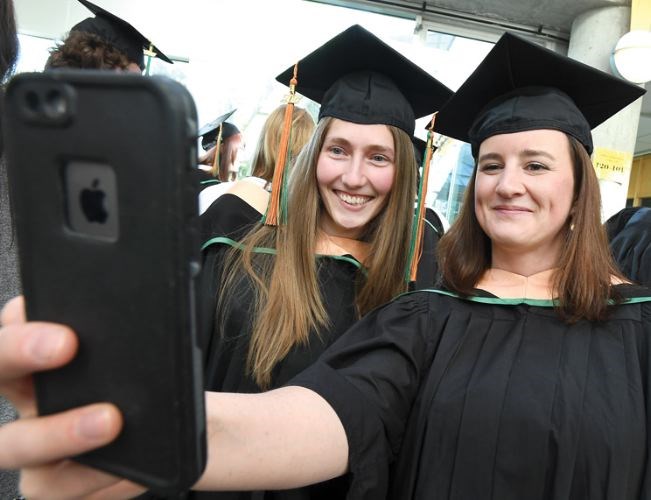UNBC is joining other Canadian universities as they are about to welcome record breaking numbers of international students this fall.
Some institutions across the country are seeing significant increases of 25 per cent or more in admissions of students from abroad.
About 10 per cent of the student population at UNBC is from out of country, but the university would like to see these numbers grow.
"This year, we are really revving this up," said Dan Ryan, UNBC interim vice president academic and provost.
"We would like to see the international student population increase to about 20 per cent. And once we reach that 20 per cent, I think that will probably be the right number for UNBC," Ryan said.
Out of 3,290 students attending UNBC, 286 are international students.
The foreign student population at Canadian universities almost doubled in the decade from 2004-05 to 2013-14, rising from 66,000 students to 124,000, according to Statistics Canada.
This means that the international student population at Canadian universities grew 88 per cent from 2004-05 to 2013-14, while the comparable growth rate for Canadian students was 22 per cent.
The number of foreign students at Canadian university campuses varied across the country with British Columbia having the highest number at 18 per cent in 2013/2014.
New Brunswick followed at 16 per cent and Nova Scotia was 15 per cent.
According to Statistics Canada, Asia was the main source region for these students accounting for over 60 per cent of all international students in 2013-14.
The exception is Quebec, however, where Europe was the largest source region at 39 per cent.
For the University of British Columbia, a regional office in Hong Kong and New Delhi is proving to be an effective post-secondary recruiting tool.
UBC has more international students than any other institution in the province.
Between 2012 and 2016, international enrollment at UBC jumped by 58 per cent from 9,144 to 14,433 students.
And students from mainland China and Hong Kong made up 36 per cent of UBC's international enrollment with an increase of 63 per cent from 2012 to 2016.
"In terms of creating awareness and raising the brand of the institution, for sure, the regional offices have helped raise exposure for UBC, Adel El Zaim, executive director of UBC's international office program told Business Vancouver in April.
"The main idea was to open offices in places considered strategic for UBC," El Zaim said.
For UNBC, new possibilities for increased international enrollment continue to develop.
"We have not invested heavily internationally, but yes, we are working on a number of new opportunities to try and increase our numbers," Ryan said.
Canada currently ranks seventh as the most popular destination for international students and 95 per cent of these students are satisfied with their experience overall, according to the Canadian Bureau for International Education.
The reason why Canadian universities are among the most attractive to foreign students might have something to do with the many uncertainties that lie elsewhere in the world.
Or perhaps UBC's success in foreign student figures has something to do with the Trump administration's position on anti-immigration.
According to Business In Vancouver, UBC president Santa Ono tweeted the day after the U.S. election that a web page for a single graduate program at UBC received more than 30,000 hits between midnight and 3 a.m.
International students bring about $8 billion into Canada annually including their tuition and living expenses.
At UNBC, tuition for Canadian students in arts/humanities programs at undergraduate levels for 2016/2017 was $5,111.
For international students, the tuition was between $11,500 - $17,889.
In comparison, UBC Canadian students pay between $5,088-$6771 per year and foreign students pay $24,486 to $30,359.
According to Statistics Canada, in 2013/2014, international students were more pronounced at the graduate level, making up 29 per cent of the doctoral students in Canada.
At the bachelor's level, international students represented 9 per cent of undergraduastes and 17 per cent of the master's programs students.
Despite rising numbers, Canadian institutions remain unanimous in saying that international admissions does not impact the number of domestic spots available.
"International students do not displace domestic students. It helps globalize the institution so that everybody, regardless of whether they grew up in Edmonton or Toronto, can meet and interact with people from around the world," University of Alberta president David Turpin told the Globe and Mail this month.
For UNBC, attracting more international students is very much on the radar.
"We want to encourage more numbers. I think it's all about letting them see UNBC," said Ryan.
"The students have to see UNBC, the size, the beautiful campus and the welcoming community we have here. Once they see it, they will really appreciate it."



